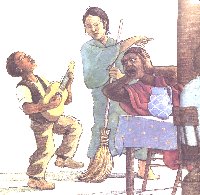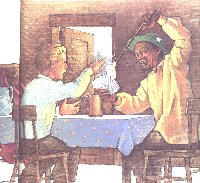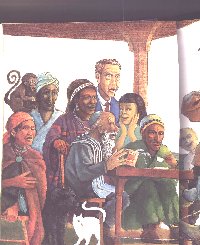


Abiyo
by Pete Seeger
first published 1987 and currently in print and available.

...Not only that. The boy's father got in trouble. The boy's father was a magician. He had a magic wand. He'd go` Zoop! Zoop' and make things disappear ......

The boy and his father were ostracised, that means they made 'em live on the edge of town... "
But before long, the villagers had reason to be grateful to the boy and his father, for Abiyoyo, the giant of dread, the giant of their dark history, came to town one day when the sun rose blood-red over the hill:

".... He had long fingernails cause he never cut 'em. He had slobbery teeth 'cause he didn't brush 'em, stinking feet 'cause he didn't wash 'em, matted hair 'cause he didn't comb it.."
Abiyoyo is grotesquely, enormously, inhumanly repulsive, a Drakonian hybrid of ogre and robot- Man's modernity gone astray.
But the boy plays to the giant on his ukelele, faster and faster, and the giant is happy and dances, faster and faster until he falls to the ground, exhausted, subdued enough for the father to go Zoop! Zoop! with his wand.
The people ran across the fields.
They lifted the boy and his father up to their shoulders.
They say, "Come back to town. Bring your darn ukelele.
We don't care anymore.
And they all sang. A-BI-YO-YO, A-Bl-YO-YO. ."
Throughout the book, the music of the boy's tune is repeated, along with thesingle-syllabled words, no doubt stimulating a small's child's interest in the notation of both language and music. Sometimes the words of the song are enormous, the music deafening, but sometimes silky- soft and enticing, enticing enough to catch and conquer a giant.

And the village? Surely this is Seeger's dream of the true 'global village'. Its people are all colours, from all races and times, yet the architecture seems strangely modern- too rigidly angled to belong in any but the technological age. In his introduction to the story, which he adapted for his children from an African folktale, Seeger says"
".. .I realise the various meanings that could be attatched to the story. I still feel that music, dance and all arts are important tools to help the human race survive, subduing the beast in all of us...."
Subtle analogies are, of course, for parents, grandparents and teachers. The children will love this book for simpler reasons- for its magnificent coloured pictures,( Michael Hays is a genius), for a good story retold, in its ancient rhythm, by a modern minstrel, and for a haunting tune even the tiniest can sing. They will want to hear it over and over, and look at it often as the pictures continue to reveal new truths, added details. They will have favourite pages, to which you must turn again and again. Our eldest grandaughter regularly reads this book to her youngest sister, who, at 11 months, knows where it sits on the shelf and can recognise it. Ten years ago, when the reader was was just 13 month old, that favourite page was the blood-red double spread, with its first glimpse of Abiyoyo silhouetted against the rising sun. But then she would always turn, at once, and with satisfaction, to the page where the father said " Zoop!..

Would that all our demons were as easily vanquished.

Want To Check Out Abiyoyo's Price And Availability?
 |


 Reactions, Comments and suggestions to: robink@mail.austasia.net
Reactions, Comments and suggestions to: robink@mail.austasia.net